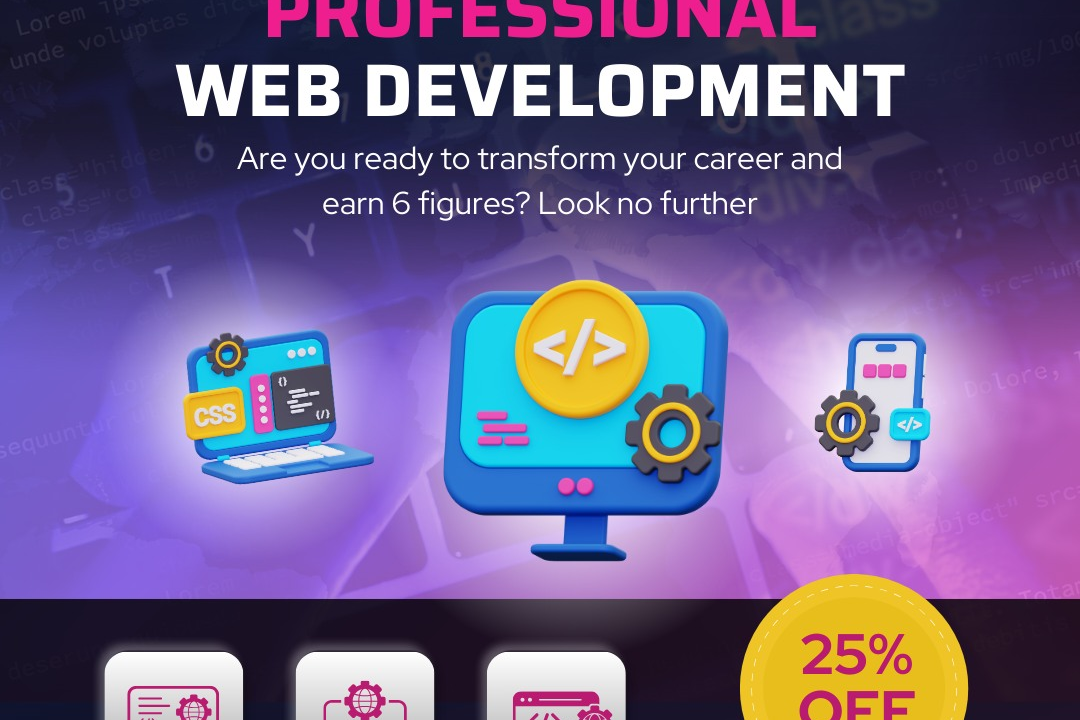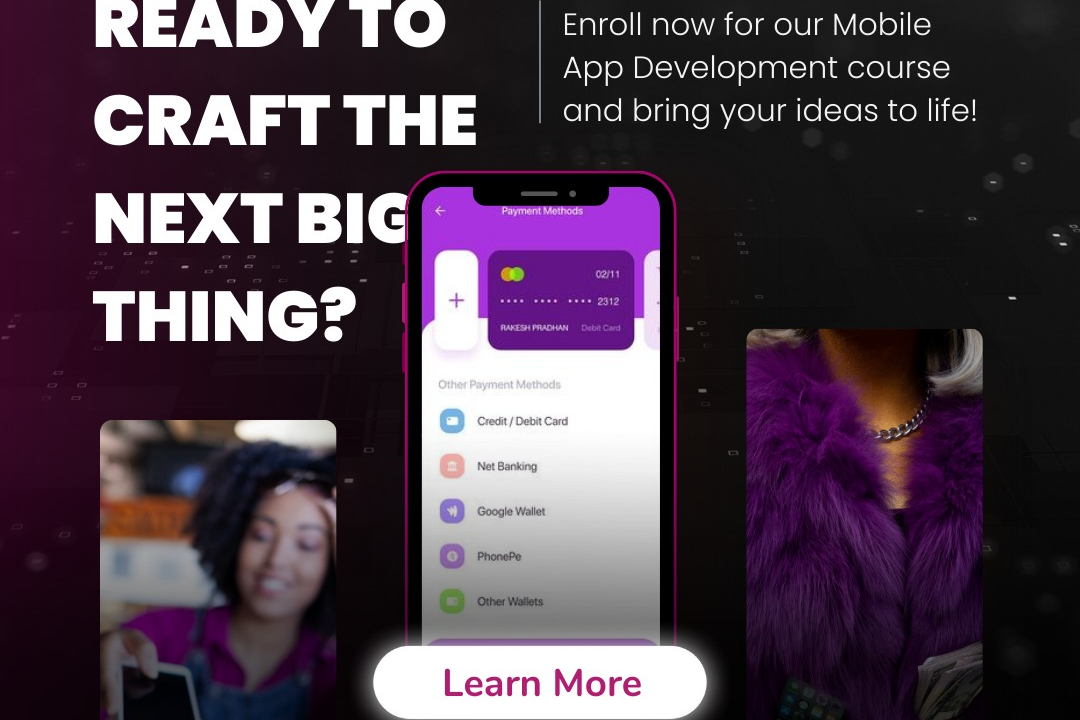Gtu PHP Programs
GTU PHP programs are practical coursework designed to help students develop proficiency in server-si
Gtu PHP Programs
GTU PHP programs provide students with practical, hands-on experience in server-side web development, equipping them with essential skills to build dynamic and interactive websites. These programs focus on real-time projects that help students understand core concepts such as database connectivity, session management, and scripting logic, making them industry-ready. By participating in GTU PHP programs, students can effectively translate theoretical knowledge into real-world applications, enhancing their employability and confidence in developing scalable web solutions.
To Download Our Brochure: https://www.justacademy.co/download-brochure-for-free
Message us for more information: +91 9987184296
GTU PHP programs provide students with practical, hands on experience in server side web development, equipping them with essential skills to build dynamic and interactive websites. These programs focus on real time projects that help students understand core concepts such as database connectivity, session management, and scripting logic, making them industry ready. By participating in GTU PHP programs, students can effectively translate theoretical knowledge into real world applications, enhancing their employability and confidence in developing scalable web solutions.
Course Overview
The ‘GTU PHP Programs’ course offers hands-on training in PHP web development, focusing on real-time projects to build dynamic websites, enhance coding skills, and prepare students for industry demands.
Course Description
The GTU PHP Programs course provides practical training in PHP web development through real-time projects, equipping students with the skills to build dynamic websites and applications efficiently.
Key Features
1 - Comprehensive Tool Coverage: Provides hands-on training with a range of industry-standard testing tools, including Selenium, JIRA, LoadRunner, and TestRail.
2) Practical Exercises: Features real-world exercises and case studies to apply tools in various testing scenarios.
3) Interactive Learning: Includes interactive sessions with industry experts for personalized feedback and guidance.
4) Detailed Tutorials: Offers extensive tutorials and documentation on tool functionalities and best practices.
5) Advanced Techniques: Covers both fundamental and advanced techniques for using testing tools effectively.
6) Data Visualization: Integrates tools for visualizing test metrics and results, enhancing data interpretation and decision-making.
7) Tool Integration: Teaches how to integrate testing tools into the software development lifecycle for streamlined workflows.
8) Project-Based Learning: Focuses on project-based learning to build practical skills and create a portfolio of completed tasks.
9) Career Support: Provides resources and support for applying learned skills to real-world job scenarios, including resume building and interview preparation.
10) Up-to-Date Content: Ensures that course materials reflect the latest industry standards and tool updates.
Benefits of taking our course
Functional Tools
1 - PHP Integrated Development Environment (IDE): In the GTU PHP Programs course, students primarily work with powerful IDEs such as PHPStorm, Visual Studio Code, or Sublime Text. These tools offer syntax highlighting, code completion, debugging support, and version control integration, making the development process more efficient and less error prone. An IDE streamlines writing, testing, and debugging PHP code, enabling students to develop complex web applications smoothly and confidently. Familiarity with these environments prepares students for professional development workflows and industry standards.
2) XAMPP/WAMP Server: Setting up a local server environment is essential for PHP development. XAMPP and WAMP are popular software packages that bundle Apache, MySQL, PHP, and phpMyAdmin into an easy to install platform. They allow students to run PHP scripts and manage databases on their personal computers without needing an external server. These tools facilitate real time testing, learning, and debugging, creating a real world like environment which accelerates understanding and mastery of web development concepts.
3) MySQL Database Management: The course emphasizes working with MySQL, a widely used relational database management system. Students learn to create, modify, and manage databases using tools like phpMyAdmin or command line interfaces. They gain skills in writing SQL queries for data retrieval, insertion, update, and deletion, crucial for dynamic web applications. These database tools help students understand data flow and storage, which is fundamental for developing fully functional PHP projects.
4) Version Control Systems (Git): Version control tools like Git are integral to modern development practices. The course introduces students to Git for tracking code changes, collaborating with peers, and managing project versions efficiently. Using platforms like GitHub or GitLab, learners can push, pull, and review code snippets, fostering teamwork skills and code accountability. Familiarity with Git prepares students for real world collaborative development environments.
5) Front end Technologies Setup: The course incorporates front end development tools such as HTML, CSS, and JavaScript, supported by editors like Visual Studio Code. These tools enable students to design and implement user interfaces that interact seamlessly with PHP backend logic. Workflows include using browser developer tools for testing responsiveness and interactive features, ensuring students can develop holistic, user friendly web applications.
6) Debugging and Testing Tools: Debugging tools like Xdebug and browser based console logs are used extensively in the course. These tools help students identify and resolve errors efficiently, understand code execution flow, and optimize performance. Integrating debugging practices into development enhances code quality and reliability, essential aspects for professional PHP development.
7) Web Hosting and Deployment Platforms: To understand deployment processes, students work with web hosting services like cPanel based hosts or cloud platforms such as Heroku. These tools simulate real world publishing environments, teach students how to upload and configure websites, and manage live server settings. It bridges the gap between development and deployment, preparing learners to launch projects effectively.
8) Code Validators and Formatters: Tools such as PHP CodeSniffer and Prettier are used to enforce coding standards and maintain consistency across team projects. These utilities automatically check for syntax errors, security issues, and styling violations, helping students write clean and maintainable code. Incorporating validation tools promotes best practices essential for scalable project development.
9) API Testing Tools: Postman or Insomnia are used to test APIs that interact with PHP backend services. Students learn to send requests, analyze responses, and debug API endpoints effectively. These tools are crucial for understanding web services integration, enhancing the development of modular and service oriented architectures.
10) Learning Management System (LMS) Platforms: The course also utilizes LMS tools such as Moodle or Canvas to deliver assignments, tutorials, and assessments. These platforms facilitate organized learning, provide resource repositories, and enable instructor student communication. They ensure structured learning paths and continuous support, making the training program comprehensive and interactive.
11 - PHP Frameworks and Libraries: Students explore popular PHP frameworks such as Laravel, CodeIgniter, or Symfony. These frameworks provide pre built modules, templating engines, and MVC architecture that accelerate development, ensure code maintainability, and promote best practices. Working with libraries like SwiftMailer, PHPMailer, or Guzzle HTTP enhances the ability to integrate third party functionalities into projects, preparing students for enterprise level development.
12) Code Versioning and Code Review Tools: Beyond Git, tools like Review Board or Bitbucket facilitate code review and collaborative feedback. Incorporating these systems into the workflow helps students learn peer review practices, improve code quality, and understand collaborative project management, mirroring real world agile development environments.
13) Continuous Integration and Deployment (CI/CD) Tools: The course introduces CI/CD pipelines using platforms such as Jenkins, GitHub Actions, or GitLab CI. These tools automate testing, integration, and deployment processes, ensuring code quality, faster releases, and seamless updates. Familiarity with CI/CD pipelines prepares students for modern DevOps practices.
14) Security Testing Tools: Students gain insights into security tools like OWASP ZAP, Burp Suite, or Nikto, enabling them to scan PHP applications for vulnerabilities such as SQL injection, cross site scripting (XSS), and other common threats. Incorporating security testing ensures students build robust, secure web applications.
15) Front End Frameworks and Libraries: Integration with front end frameworks like Bootstrap, Angular, React.js, or Vue.js enhances the user interface design. These tools facilitate responsive and interactive UI development, crucial for comprehensive full stack PHP projects.
16) Cloud Storage Services: Incorporating cloud storage solutions such as Amazon S3 or Google Cloud Storage teaches students how to manage and serve static assets, media files, and backups efficiently. This knowledge is vital for scaling applications and managing large datasets.
17) Containerization and Virtualization Tools: Tools like Docker and VirtualBox are introduced to encapsulate development environments. Containerization ensures consistency across development, testing, and production stages, simplifying deployment workflows and environment management.
18) Analytics and Monitoring Tools: Integrating Google Analytics, New Relic, or DataDog into projects helps students monitor website performance, user behavior, and system health. These insights are essential for optimizing applications and providing data driven improvements.
19) Email Testing Tools: Tools like MailHog or Mailtrap allow students to test email functionalities without spamming actual inboxes. They are critical for developing secure, reliable email notification systems within PHP applications.
20) API Development and Documentation Tools: Using Swagger or Apiary, students can design, document, and test RESTful APIs. These skills are fundamental for building scalable, interconnected, and easily maintainable web services.
21 - Performance Optimization Resources: Tools such as New Relic, Blackfire, or GTmetrix enable students to analyze and improve application performance. Understanding performance bottlenecks leads to building faster, more efficient web applications suitable for production environments.
22) Data Visualization Tools: Incorporating libraries like Chart.js or D3.js allows students to create dynamic data visualizations within their projects. This enhances the interactivity and insights delivered through web applications.
23) Accessibility Testing Tools: Tools like WAVE, Axe, or AChecker help ensure that web applications meet accessibility standards (such as WCAG). Developers learn to create inclusive interfaces compatible with diverse users.
24) Learning and Practice Platforms: Platforms like HackerRank, LeetCode, or Codewars facilitate practice through coding challenges which help students strengthen problem solving skills and algorithmic thinking critical for efficient PHP development.
25) Real time Collaboration Tools: Incorporating Slack, Microsoft Teams, or Discord allows students to communicate and collaborate effectively during projects, simulating professional work environments and enhancing teamwork skills.
26) Backup and Recovery Solutions: Tools for automatic backups like Acronis or cloud based snapshot services teach students how to safeguard data and recover from failures, ensuring reliable project deployment and maintenance.
27) Licensing and Compliance Tools: Resources that assist in managing open source licenses and compliance, such as FOSSA or WhiteSource, educate students on legal and ethical use of third party code, fostering responsible development practices.
28) Project Management Software: Tools like Trello, Jira, or Asana enable effective task tracking, sprint planning, and progress monitoring, helping students develop organizational skills vital for managing complex projects.
29) Code Quality Analysis Tools: Static code analyzers like PHP_CodeSniffer, SonarQube, or PHPStan assess code for bugs, style violations, and security issues, encouraging a culture of quality and best practices in coding.
30) Learning Resources and Documentation Platforms: Access to platforms like MDN Web Docs, Stack Overflow, or official PHP documentation supports continuous learning, troubleshooting, and staying updated with latest industry trends and standards.
Browse our course links : https://www.justacademy.co/all-courses
To Join our FREE DEMO Session:
This information is sourced from JustAcademy
Contact Info:
Roshan Chaturvedi
Message us on Whatsapp: +91 9987184296
Email id: info@justacademy.co
Microsoft Power Bi Training In Hyderabad
Power Bi Training Online Course












